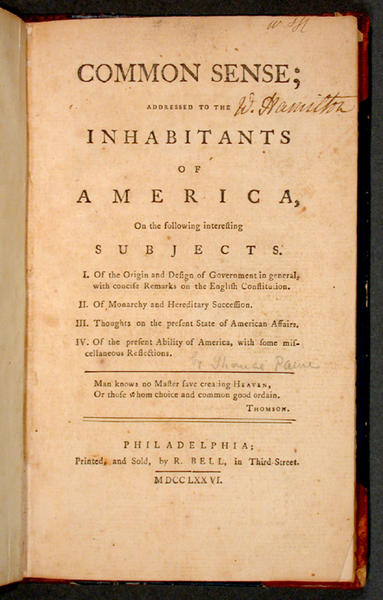 THIS day was published, and is now selling by Robert Bell, in Third-street (price two shillings) COMMON SENSE addressed to the inhabitants of America, on the following interesting SUBJECTS.
THIS day was published, and is now selling by Robert Bell, in Third-street (price two shillings) COMMON SENSE addressed to the inhabitants of America, on the following interesting SUBJECTS.
I. Of the origin and design of government in general, with concise Remarks on the English constitution.
II. Of Monarchy and Hereditary Succession.
III. Thoughts on the present state of American affairs.
IV. Of the present ability of America, with some miscellaneous reflections.
The Pennsylvania Evening Post printed the above advertisement on January 9, 1776. This pamphlet written by Thomas Paine (though the world didn't know that yet) spread like wildfire through the American colonies, with Paine claiming in his later work Rights of Man that over 100,000 copies of Common Sense had been sold. Paine and Bell's timing could not have been better — in that same issue of the Pennsylvania Evening Post, on the same page as the advertisement for Common Sense in fact, was the text of a speech King George III delivered in Parliament on October 27, 1775. A speech that expanded on the King's earlier Proclamation of Rebellion and included inflammatory remarks such as "When the happy and deluded multitude... shall become sensible of their error, I shall be ready to receive the misled with tenderness and mercy!" Enter Paine's pamphlet, which argued that "the sun never shined on a cause of greater worth" and "the last cord is now broken".
 Since it was first printed in Philadelphia, some of the first readers of Common Sense were the delegates to the Second Continental Congress. Some were thrilled by Common Sense, while others appreciated the section on American independence and dismissed the rest of it. As Steven Pincus explains in The Heart of the Declaration, "perhaps no single piece of writing did more to articulate the importance of unmaking the British Empire than Thomas Paine's Common Sense," but the plan of government described in the pamphlet "was a far cry from that envisioned by most Patriots." One delegate in particular "dreaded the Effect so popular a pamphlet might have, among the People" (any guesses who?). Find out what these soon-to-be signers of the Declaration of Independence thought about Common Sense, which signer took credit for giving the pamphlet its name, and how John Adams responded to the "Disastrous Meteor", Thomas Paine.
Since it was first printed in Philadelphia, some of the first readers of Common Sense were the delegates to the Second Continental Congress. Some were thrilled by Common Sense, while others appreciated the section on American independence and dismissed the rest of it. As Steven Pincus explains in The Heart of the Declaration, "perhaps no single piece of writing did more to articulate the importance of unmaking the British Empire than Thomas Paine's Common Sense," but the plan of government described in the pamphlet "was a far cry from that envisioned by most Patriots." One delegate in particular "dreaded the Effect so popular a pamphlet might have, among the People" (any guesses who?). Find out what these soon-to-be signers of the Declaration of Independence thought about Common Sense, which signer took credit for giving the pamphlet its name, and how John Adams responded to the "Disastrous Meteor", Thomas Paine.
... Read more about Delegate Discussions: Common Sense